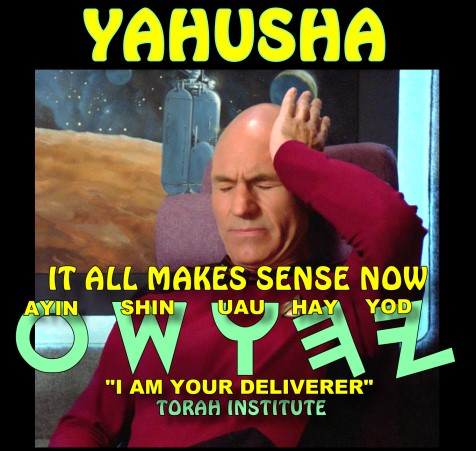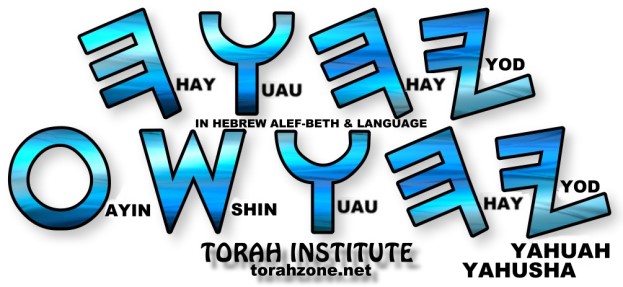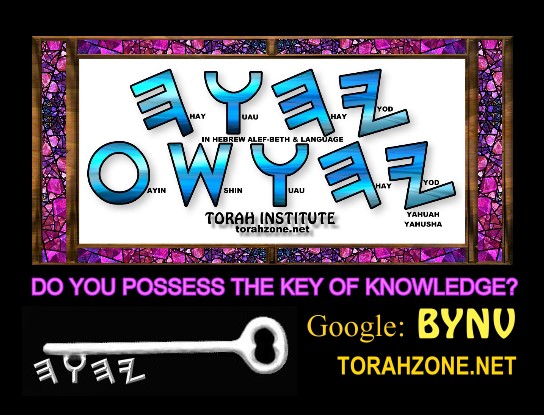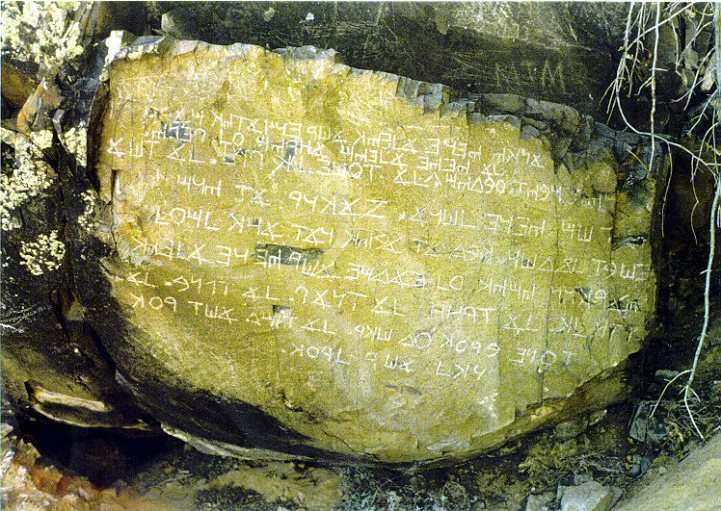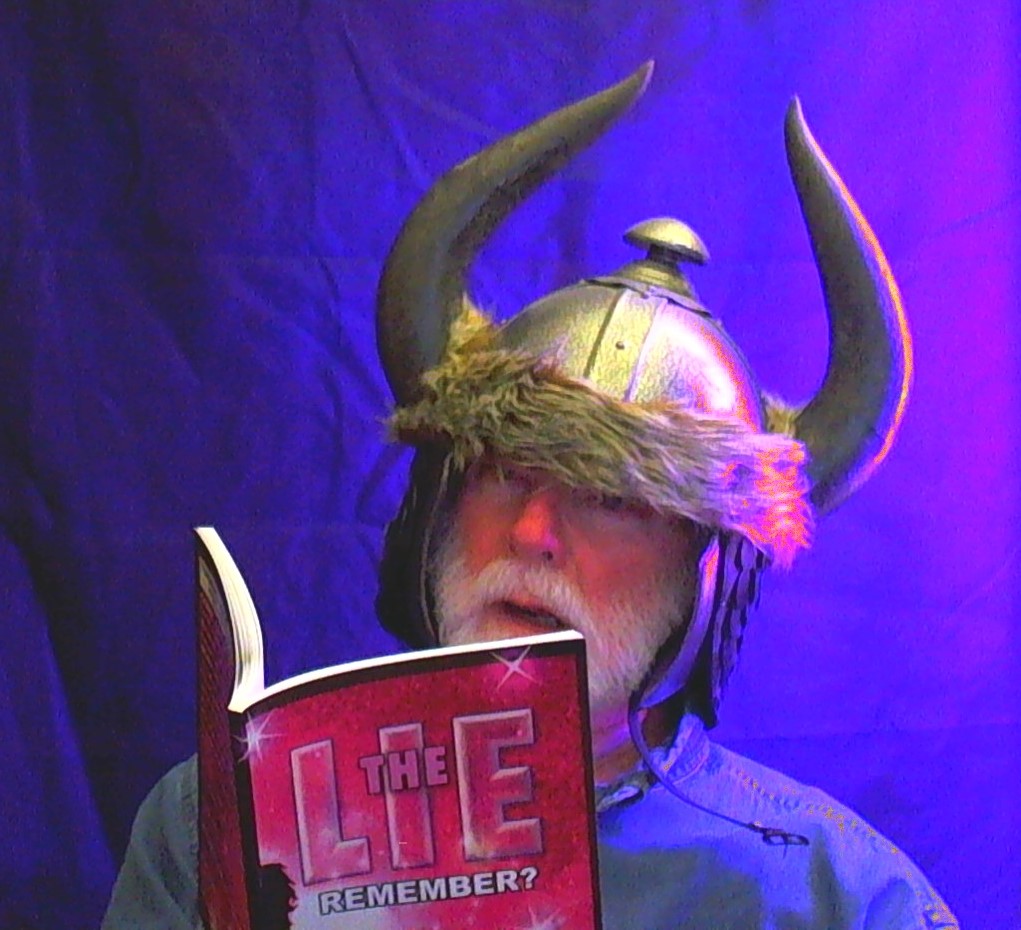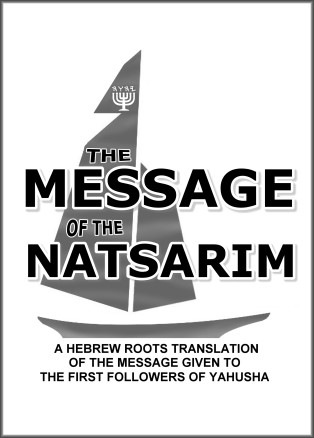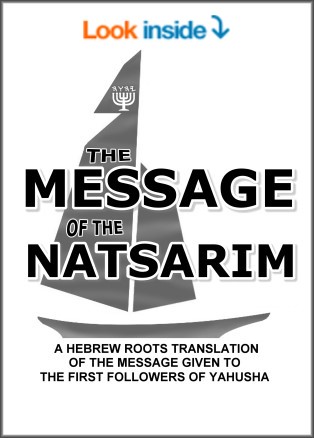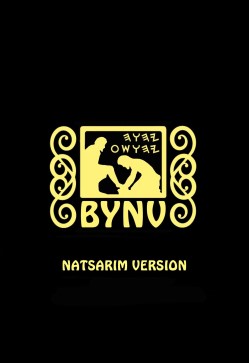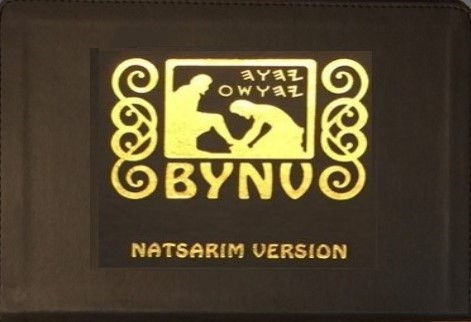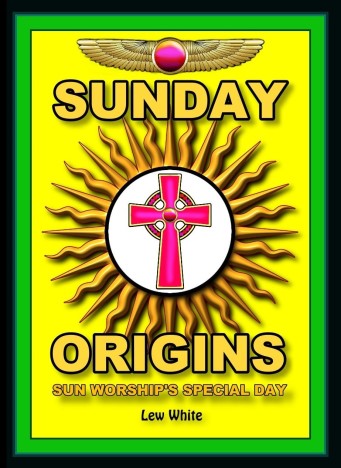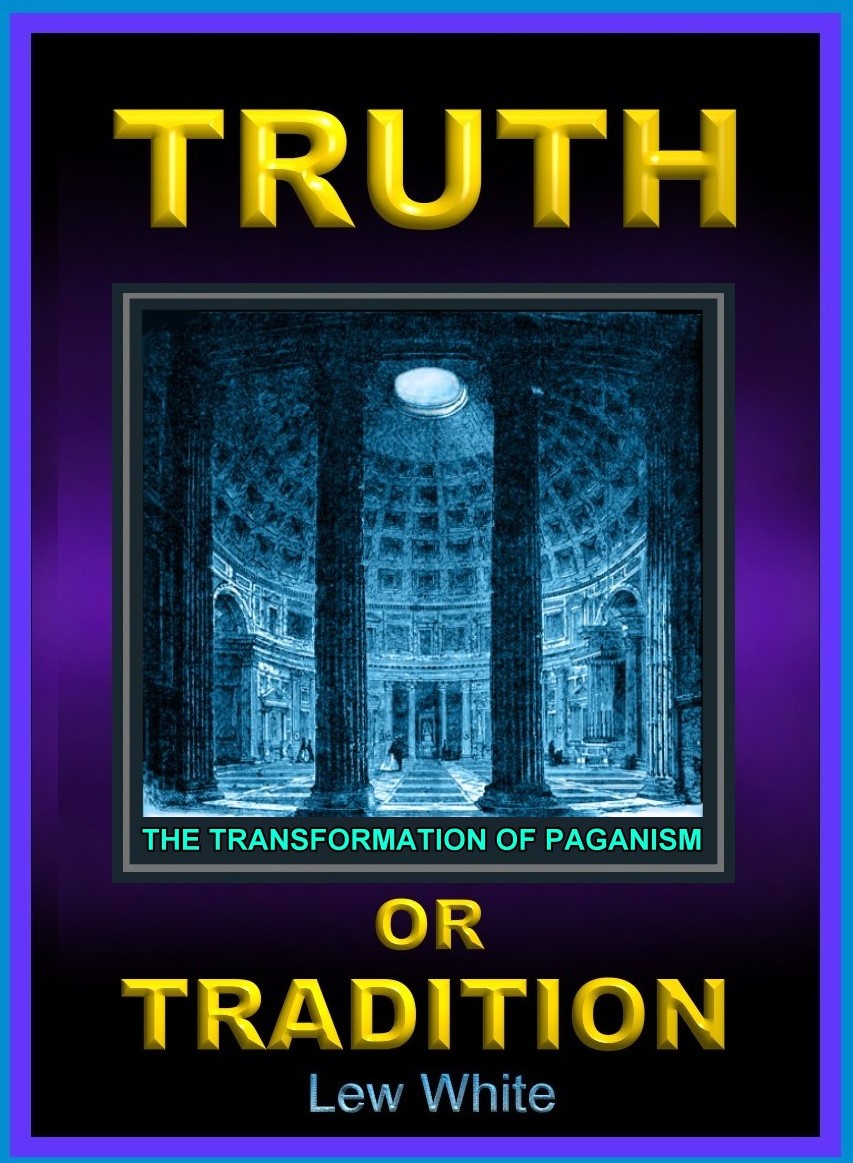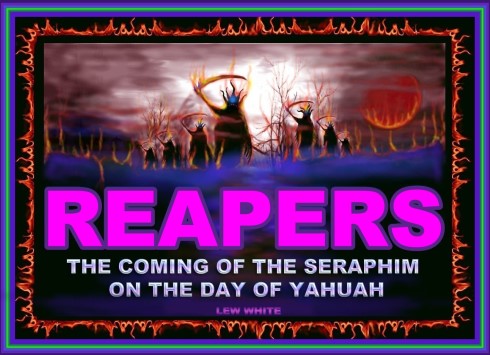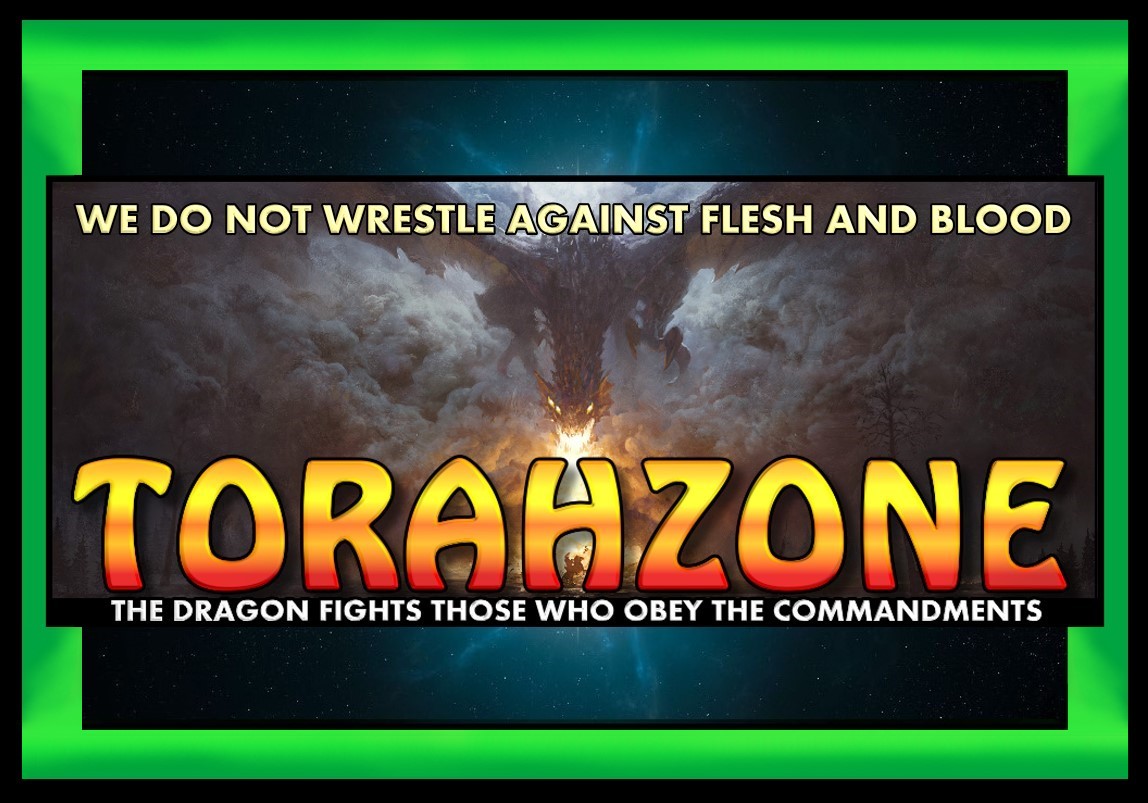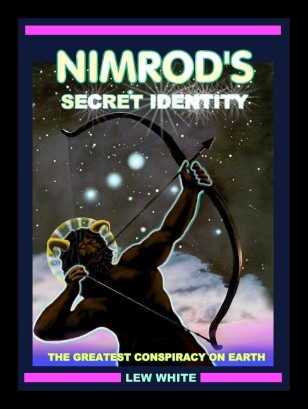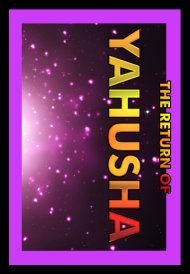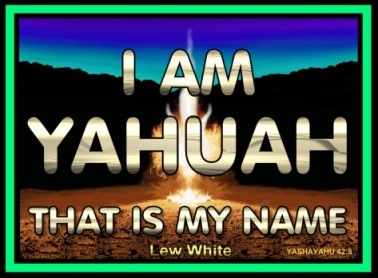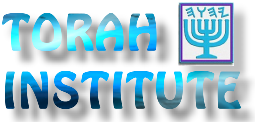
Hebrew Roots research by Lew White
PREMISE OF THIS STUDY:
Our Deliverer's Name Is Not Greek, it's Hebrew
Why Do People Call On "the LORD?"
YAHUSHA
What is the meaning of this Name?
BABBLE ON
Because the
Latin and Greek fail us, many of us have come to question what the
babblers handed-down to us. (See Proverbs 18:17). Those who have
searched the Eberith / Hebrew texts know there are 3 variations of the
Mashiak's Name found. The Greek cannot form the proper transliteration
of the letters yod hay uau shin ayin, found 216 times in the TaNaK, and
the Latin follows the Greek, so the world has not known until recent
decades Who they are calling on for their deliverance. The shortest
(diminutive) form of the name uses 4 letters, and is found one time (yod
shin uau ayin, at NekemYah 8:17). The text uses six letters in two
incidences, yod hay uau shin uau ayin, at Dt. 3:21 & Judges 2:7.
http://www.fossilizedcustoms.com/transliteration.html
We may all agree on the Hebrew Name, but building the tower of Babel caused Yahuah to confuse mankind's speech, resulting in the current confusion.
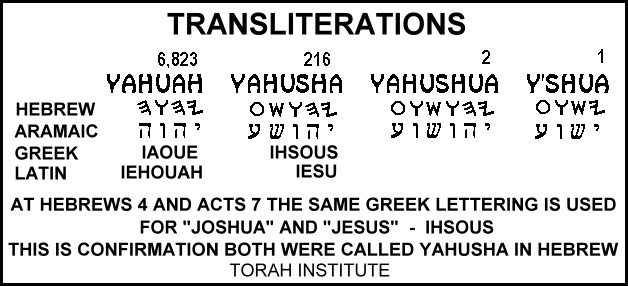
His Name is YAHUAH, Who became our Deliverer
With the suffix SHA it becomes YAHUSHA, meaning YAHU (I am your) + SHA (Deliverer)

WHAT WAS WHISPERED IN THE INNER ROOMS?
THE NAME OF THE CREATOR, YAHUAH, WAS PRESERVED
FOR US IN THE DEAD SEA SCROLLS
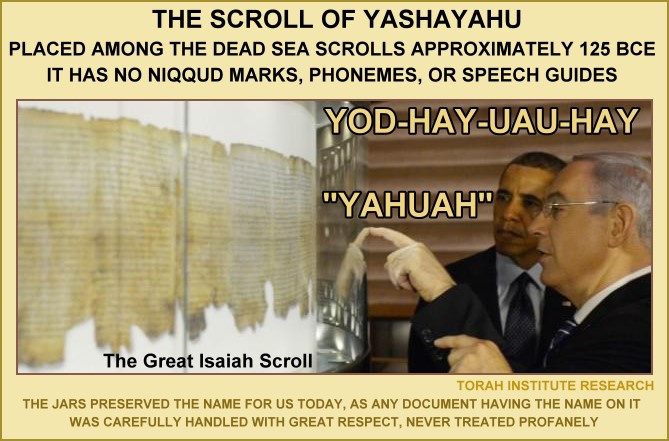
THE KEY OF KNOWLEDGE IS THE STONE THE BUILDERS REJECTED:
THE NAME "YAHUAH" WRITTEN IN FOUR HEBREW VOWELS
NO TWIDDLYDINKLES?
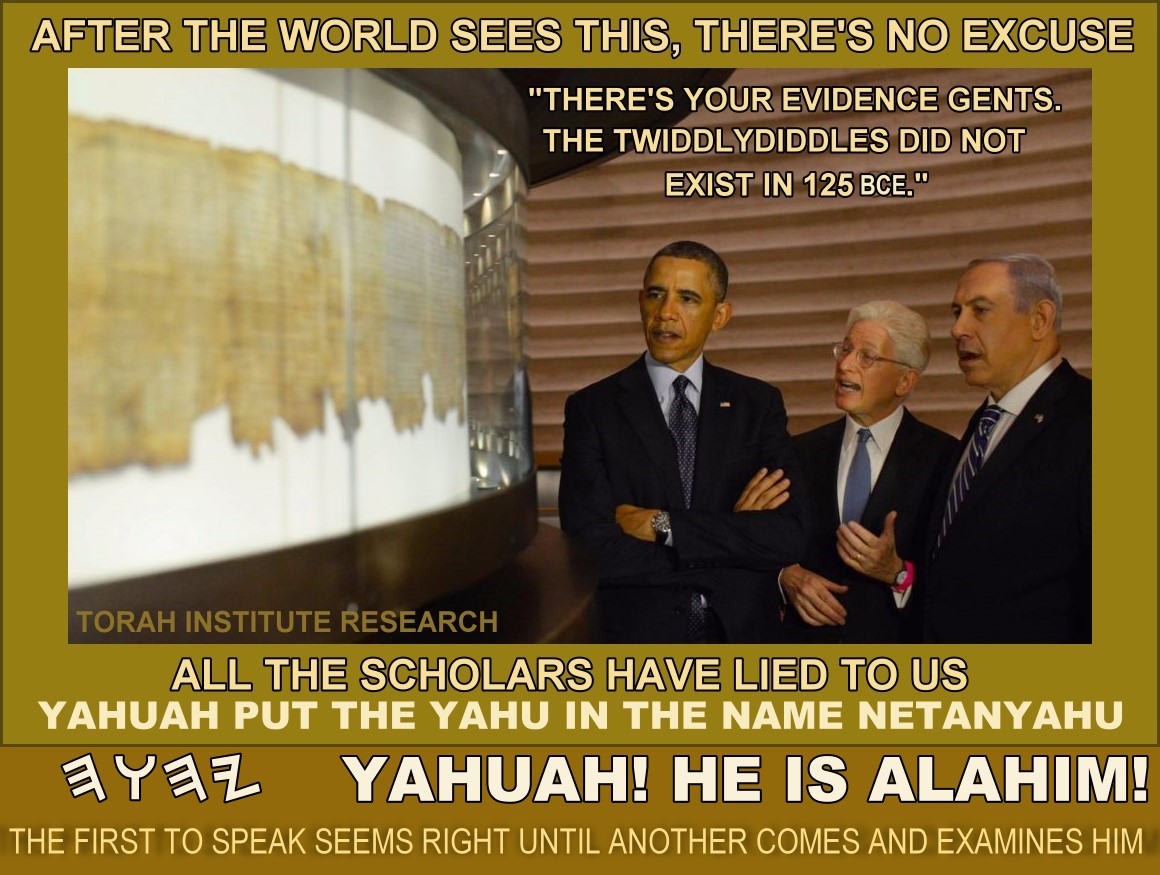
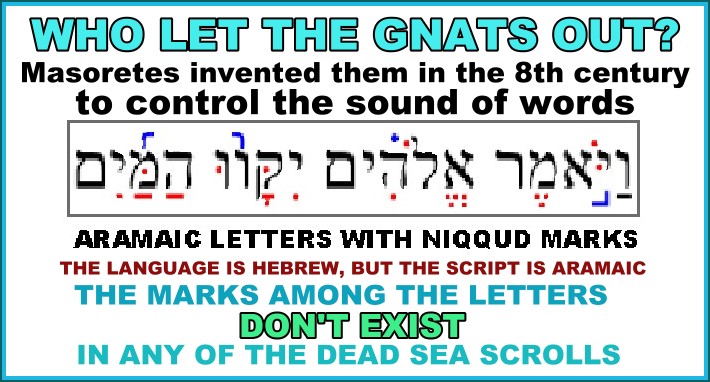
NO LETTER "W" IN HEBREW?

THE LATIN V SOUNDED LIKE OUR U
VIDEOS ON YOUTUBE:
Misunderstandings about
Vowels & Consonants
Unpacked:
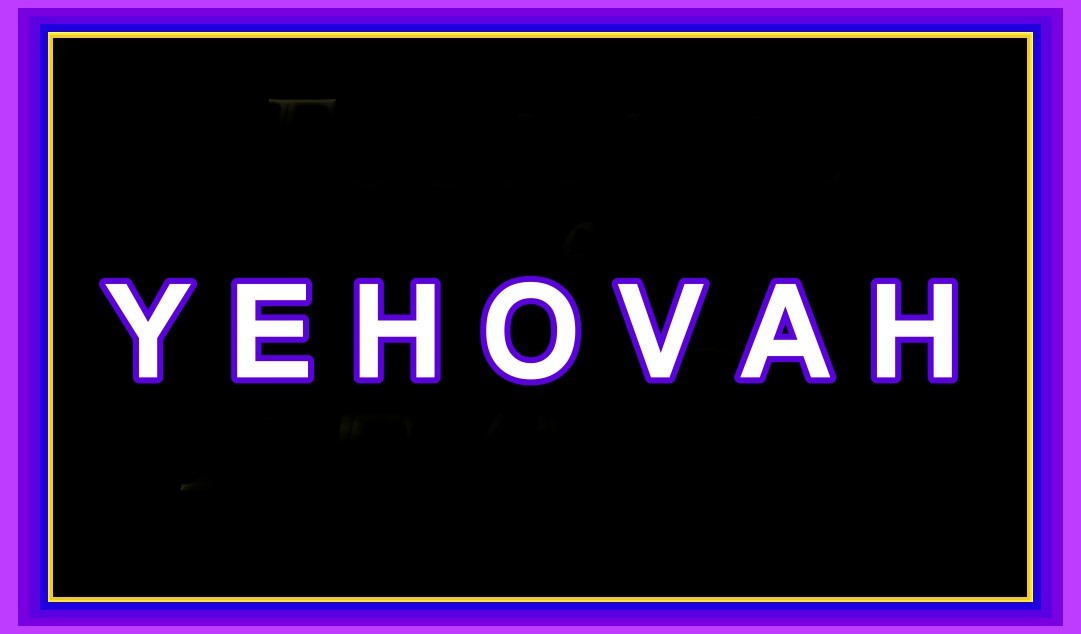
see also:
http://www.fossilizedcustoms.com/iesu.html
http://www.fossilizedcustoms.com/name.html
http://www.fossilizedcustoms.com/yahusha.html
http://www.fossilizedcustoms.com/w.html
http://www.fossilizedcustoms.com/loslunas.html
http://www.fossilizedcustoms.com/hebrew.html
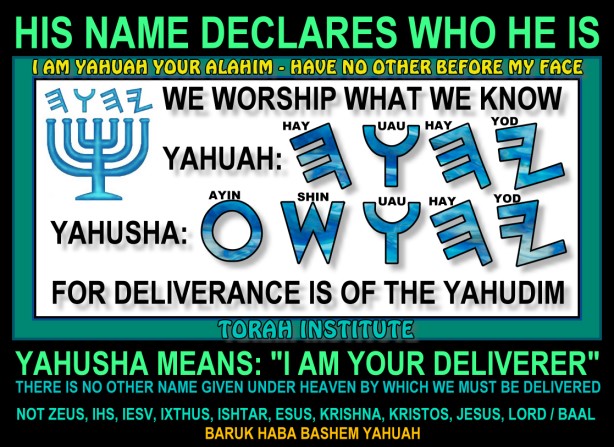
The Letters of the Name Are Vowels
YUSEF BEN MATITHYAHU, 1ST CENTURY HISTORIAN, SAYS THEY
ARE.
The historian called
Josephus* described seeing the four vowels written in Hebrew letters on the headpiece of the kohen ha gadol:"A mitre also of fine linen emcompassing his head, which was tied by a blue ribbon, about which there was another gold crown, in which was engraven the sacred Name. It consists of four vowels."
*
Yusef Ben MatithYahuwww.fossilizedcustoms.com/transliteration.html
The Transliteration of the Name
Pro 30:4: "Who has gone up to the heavens and come down?
Who has gathered the wind in His fists?
Who has bound the waters in a garment?
Who established all the ends of the earth?
What is His Name, And what is His Son’s Name, If you know it?"
What Is the Hebrew Name for JESUS?
It is definitely not "JESUS." 2000 years ago in Beth Lekem, no one had ever heard the name "JESUS."
This word JESUS appeared for the first time in the 1600's, in later editions of the KJV.
IESV
The original 1611 KJV borrowed from the Latin Vulgate's IESV.
It was underlined because it stood in place of a name.
THE TRUE NAME WAS HIDDEN BY CHRISTOGRAMS:
IESV, IES, IHS, IC-XC, IESOUS, and IXTHUS are all christograms - characters encoding the real Name.
To get to the Truth of the Name, we'll be skipping the Greek and Latin and go straight to the source of all Truth, the inspired text, Hebrew.
People will say, "Jesus is His Name in English."
No, it's the mistake for His Name in English.
His Name is Hebrew, and is YAHUSHA in all tongues, just as your own name is what it is in all tongues.
What is Benjamin Netanyahu's name in French?
We're not translating anything, we're transliterating.
The Greek language serves to confirm one clear thing about the true Name of our Mashiak: Acts 7 and Hebrews 4 both point to the fact that the Name is spelled yod-hay-uau-shin-ayin. This is simply because both "JESUS" and "JOSHUA" have the underlying letters, IESOUS.
The Talmud would like us to believe that His Name is spelled JESCHU, based on YESHU, the acronym for yemach shmo u'zikro, "may his name be blotted out."
At the top of this picture we see the original Hebrew letters for the Name YAHUAH, and below it the Name
YAHUSHA. Reading the words from right-to-left, we immediately recognize the first 3 letters are the same vowels (YOD-HAY-UAU) - YAHU. The SHIN-AYIN (SHA) is a suffix, bringing the meaning of DELIVERER to the Name: YAHU (I AM YOUR) + SHA (DELIVERER).
Due
to vowel-point manipulation during the
6th through 11th centuries by the sect known as
the Masoretes (traditionalists), the form
YAHU
was altered to become “YEHO.”
That was not all they did to the language. People today are using
vowel-pointing to steer people into their version of the Name in Latin
letters.
There is a world-wide awakening taking place to prepare our hearts for Yahusha’s
first-fruits to be sealed against the coming deception.
This is not to divide us, but to restore unity in His Name:
“And I am no more in the world, but these are in the world, and I come
to You. Set-apart Father, guard them
in Your Name
which You have given Me,
so that they might be one, as We are.”
- Yahukanon / John 17:11, BYNV Kindle Edition
FOR THE UPPER BACK WINDOW OF YOUR CAR OR TRUCK:
YOD-HAY-UAU-SHIN-AYIN: FOUND 216 TIMES IN THE TANAK
A Very Hairy
Situation
Going backward through languages, "JESUS" becomes "ESAU" in
Hebrew! Try to follow the logic here; we're going to use the same
logical flow, only in reverse:
Whenever we see discussions on the difference between "Yahusha"
and "Jesus," it's important to realize it is somewhat like comparing
apples with oranges. One is Hebrew, the other Greek. We know the Name
was prophesied at ZekarYah chapter 3, "Yahusha."
If we were to start with the Hebrew, we
would never arrive at "Jesus" going from Greek then Latin, as it is
claimed.
But, if we start with Jesus, and
back-track to Hebrew, we go from the Latin
IESU
to the Greek IESOUS, and find the closest Hebrew name to be ESU
(AYIN-SHIN-UAU).
IESU
and
ESU
are about as close as it gets. The 7th century Arabic form for IESU and
ESU is
ISA.
The Hebrew "ESU" (meaning "hairy") is the name of YaAqob's twin brother, aka "ESAU."

HAIRY!
Let's begin with the foundation, the Hebrew Roots of the Name used in all of the Hebrew Scriptures:
The tetragrammaton normally represented as YHWH:
Yod Hay Uau Hay
The 4 letters (Tetragrammaton means "four letters" in Greek).
The letter double-U (W) did not exist until the 14th century.
More correct: YHUH in our Latin letters
Clement of Alexandria transliterated it in Greek: IAOUE
How is it best pronounced (transliterated)?
Our Deliverer's Name is not Greek, it's Hebrew
YAHUSHA & YAHUSHUA ARE BOTH CORRECT TRANSLITERATIONS
Also, the one incidence at NekemYah 8:17 is acceptable as an abbreviated form.
THE MESSIAH'S NAME IS
FOUND 219 TIMES IN
THE TANAK.
In 216 of
these, the spelling is: yod-hay-uau-shin-ayin: YAHUSHA
The son
of Nun (a
leader of the tribe Afraim) we find in the concordance started out with a four-lettered name, HUSHA. Mosheh changed it by adding one letter (YOD)
to the beginning of
his name:
#1954:
HAY-UAU-SHIN-AYIN (HUSHA),
rendered in the KJV as “HOSHEA” (Dt. 32:44), and “OSHEA” (Num 13:16).
#3091:
YOD-HAY-UAU-SHIN-AYIN (YAHUSHA
= Y+HUSHA);
this spelling is found
216 times, rendered in the KJV as “JOSHUA.”
In another two instances
in all of Scripture it is spelled
YOD-HAY-UAU-SHIN-UAU-AYIN, or “YAHUSHUA.”
IN ONE PLACE,
IT IS FOUND SPELLED YOD-SHIN-UAU-AYIN (NEHEMYAH
8:17).
Zechariah (ZekarYah) chapter 3 plainly shows the Name of our High Priest: Yahusha.
The Name of our Mashiak is provided by the Greek transliteration, but only because it points to the fact that Mosheh's successor and our Mashiak's Name use the same letters in Greek. Hebrews 4 and Acts 7 contain the evidence of this. Our Mashiak was named Yahusha, and the Yisharalite leader that brought the children of Yisharal into the Land was also named Yahusha. Both mens' names are rendered as IESOUS in the Greek, so all we have to do is look up the real Hebrew spelling for the man translators have called "Joshua" and we've found the precious treasure we've been seeking. We don't need to investigate the fine points of HETA and EPSILON - these things are rendered irrelevant.
Yahusha's Name is Hebrew, so that's where we need to look. It means Yah - our - Deliverer, or more plainly, "I AM YOUR DELIVERER." IESOUS has no meaning in Hebrew, unless "horse" is part of the meaning (SOOS, the Hebrew word for horse). SUS is Latin for PIG. Zus/Zeus may have some meaning to the Greeks, but not to Yisharal.
At Ezra 2:2, the name Y'shua appears among a list of many other names. In fact, this is found about 28 times in the TaNaK, and in one of these (NehemYah 8:17) it is used to refer to the son of Nun, so in ONE CASE there is evidence that the Name of Mashiak is associated with that specific spelling, yod-shin-uau-ayin.
The name Y'shua and Shua both share the common root, YASHA meaning deliver, rescue, save, or help.
Often a primary root is overlooked, but in this case the root YASHA gives the component "SHA" its meaning, to deliver. SHA is a component in the Name YAHUSHA (or YAHUSHUA).
Most all seminary-trained folks are still cruising down the road explaining things in terms of what they refer to as the
"New Testament Language" (Greek). So, they're blocking the vital source of all Truth, Hebrew; and until they can break with this mental block, they will remain a prisoner, and "a student of the New Testament Language." What is the language of Yisharal?Yahuah is not Greek, and neither is Yahusha. His Name and His language is Hebrew. The Jesuits approach the issue of the Name from only the Greek, dissecting the fine points of the letters, exactly as most all seminary-trained folks have been programmed to do.
THE HEBREW NAME KNOWN AS YAHWEH IS 4 VOWELS:
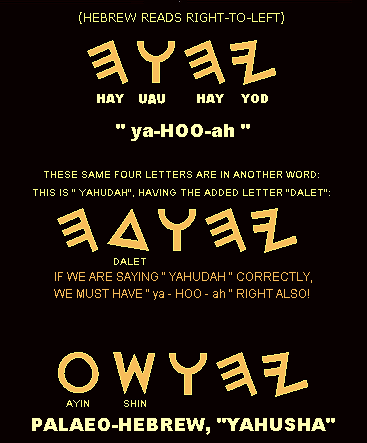
EARLIEST FORM OF THE NAME IS THE UNMOLESTED FORM OF IT.
FLAVIUS JOSEPHUS STATES IT IS FOUR VOWELS (Yusef Ben MattithYahu)
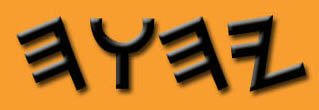
Hebrew Letter Chart (save it as a picture and share):
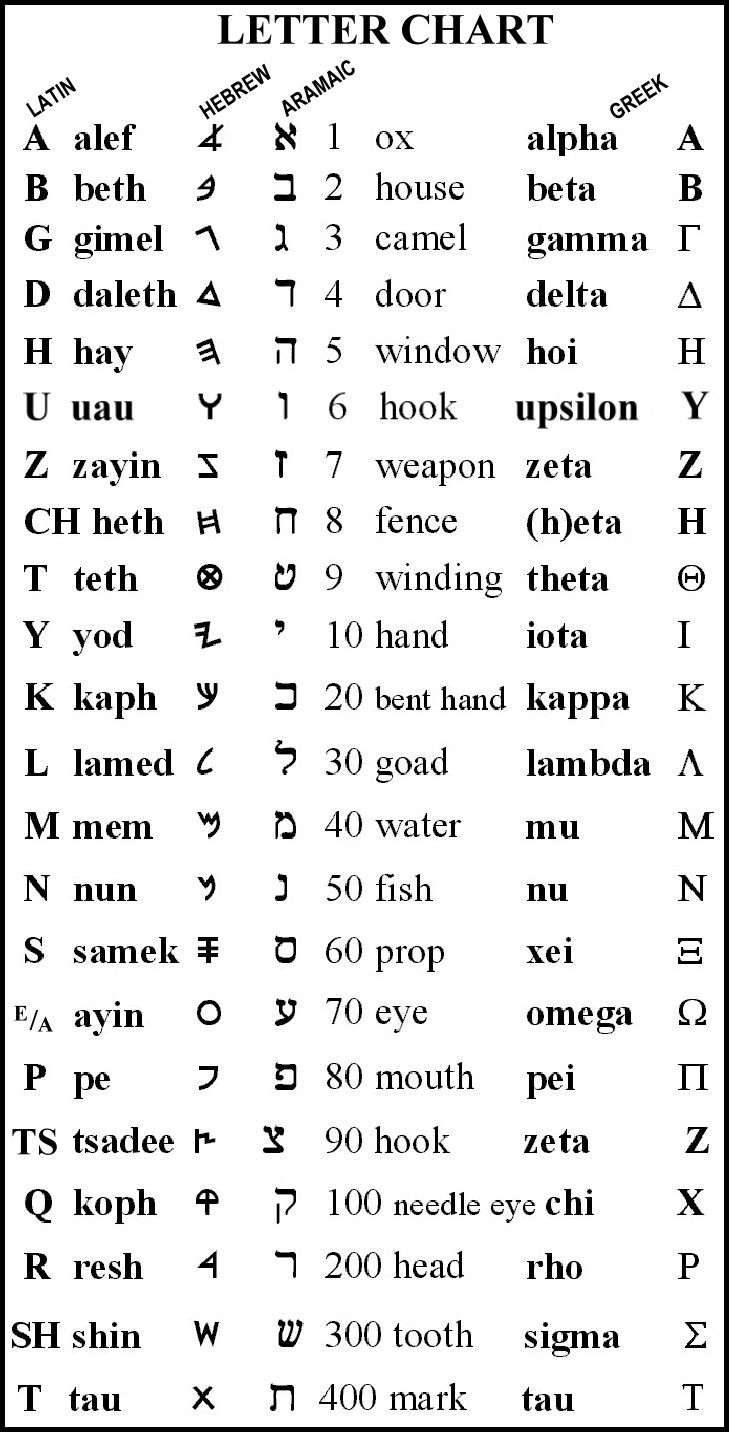
The Los Lunas Stone in New Mexico USA shows the four vowels of the Name in several places among the Ten Commandments written on a huge stone at the gate of one of the colonies in North America.
You can read it in true Hebrew on the first two lines in the photo.
The Name is seen as the second word from the top-right, and written again right below it in four vowels, yod-hay-uau-hay.
The Name on this stone is a witness that exists from 900 BCE from the ships sent out into the world by Shalomoh (aka Solomon). Notice there are no additional marks added to tweak the phonology of the Name.
Teachers profane the Name by averting a reader to say "ADONAI" in place of it, which Yahuah had pronounced death upon anyone that would cast His Name to ruin. The third Commandment is being violated in plain view every single day, and those who point it out are considered evil, while those causing the ruin are considered good.
The Dead Sea Scrolls have no "vowel markings" either, so those teaching people to use them are in league with destroyers of His Name if they hear the Truth and continue to promote the lie.
Get the new book: The LIE - The Truth Will Set You Free
WATCH: THE "STONES CRY OUT" SEMINAR ON YOUTUBE:
http://www.youtube.com/watch?v=MRkSWfzoiCI
Transliteration study on the Name of the Messiah:
yod-hay-uau-shin-ayin
While studying the true Name, remember: Yahusha (or Yahushua) isn't a Christian, and His Name isn't based on Greek, but Hebrew.
The KJV was the first to show the world the spelling "JESUS". 216 times, we find it spelled in the TaNaK: yod-hay-uau-shin-ayin
YAHU + SHA is the English transliteration of the above 5 Hebrew letters.
THE NAME JESUS IS A RECENTLY-INVENTED WORD
Charles Darwin didn't know cells existed in his time, and the apostles didn't know the word "JESUS" existed in theirs.
The word JESUS had not been "discovered" until around 1530 CE (cells are real, but the word "JESUS" was not discovered, but rather invented).
MUTATION FLOW GRAPH
The elephant in the room is this:
The graphing of the
mutations above
only shows how the distortions occurred, it is not a justification
for the mutations.
So-called scholars are looking at the alterations
caused by intervening alphabets instead of taking the original letters from
the Hebrew directly into the modern English alphabet.
The letters of Yahusha's Name has been put through the meat-grinders of foreign languages, and passed from one distortion to further distortion.
The Aramaic form, (yod-shin-uau-ayin),
“Y’shua”, is a construction found ONCE as a name in Scripture at NehemYah 8
(the only incident in all of Scripture for this spelling), and is a
shortened form of "Yahusha". Another 27
The graphing of the mutations only shows how the distortions occurred, it is
not a means of justifying the mutations.
The "English" name, Jesus (in some countries, JEZUS)
The Norman invasion of 1066 introduced the letter "j" to England but the sound of the letter did not exist in the Old English language until the early 1200's. Over the next 300 years the hard "J" sound started to replace male names that began with I or Y because it sounded so masculine. Names like Yitsaq / Iames became "James," YaAqob / Iakob became Jacob, and Yahukanon / Yohan became "John." During the time the letter J was starting to gain acceptance, John Wycliffe became the first person to translate the New Testament from Latin into English in 1384. He preserved the Latin spelling and pronunciation of IESUS but his translation was unread by the common man because only a few hand-written copies of his Bible were produced which were quickly banned by the Church. The KJV was legally the only "authorized" version allowed in England, and was produced to stamp out the Geneva translation (The Geneva "Bible" contained many footnotes, reference helps, and conveyed a high level of general information for people to learn).
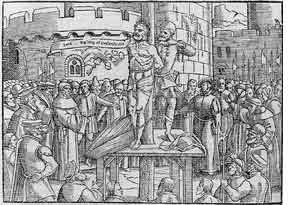
When
Gutenburg invented the printing press the Latin Vulgate Bible became the
first book ever printed in 1455. The first printing of the Scriptures in a foreign tongue
was the German Mentel Bible of 1466 followed by the Martin Luther bible of
1522.

After William Tyndale was denied permission to print an English bible he went to visit Martin Luther and completed his translation of the New Testament in 1525. Tyndale had 18,000 copies printed at Worms and smuggled into England of which only two copies survive. After printing his revised edition of 1534 he was captured in Belgium, tried for heresy by order of the pope, and put to death in 1536 by strangulation after which his body was burned at the stake.
By the year 1611 the letter "J" was officially part of the English language and the King James Bible was printed along with pronunciation guides for all proper names like Jesus, Jew, Jeremiah, Jerusalem, Judah, and John.
The name "Jesus" has been in use ever since.
At Acts 4:12, we learn that there is only ONE NAME under heaven, given among men by which we may be saved, yet we see that the true Name has been under constant change over the centuries. Originally, it was spelled
yod-hay-uau-shin-ayin.The true Name of the Mashiak can be proven by deduction; and you should know that we cannot trust the Greek to explain the Hebrew. But, when we see that the Greek text uses the same letters (IESOUS) when referring to the men that translators spell as "Joshua" and "Jesus", then we know these letters refer to not just a similar name, but the same name; the Greek alphabet simply corrupted the Name for us.
We can fix that easily. The Mashiak of Yisharal certainly never had a Greek name, so let's hunt-down His real, Hebrew Name! At Hebrews 4 and Acts 7 (Hebrews written by Paul, and Acts by Luke), we discover from the Greek that the Savior's Name is spelled IESOUS. I'm not saying these two men wrote the text in Greek, but the Greek is what we have received. The name "JESUS" isn't even in the original Scriptures - and you can check out the way it looked back in 1599 by clicking on this:Hebrews 4 and Acts 7 refer to "Joshua" (Yahusha more accurately), using the same Greek letters, IESOUS. Now think very hard; could the successor of Mosheh and the Mashiak of Yisharal possibly have the same NAME in the original Hebrew? Scholars don't doubt it for a second that they did indeed. To learn the real name of your Savior, go look at the Hebrew letters for the spelling of "Joshua": yod-hay-uau-shin-ayin (It isn't rocket surgery you know). Both had the Hebrew name: YAHUSHA (spelled twice in the TaNaK as YAHUSHUA). The Greek alphabet cannot transliterate this word, and "Latinizing" the Greek form only makes it freakier. The Name of our Savior contains the Name of our Creator, because He is our Creator, and His Name is His identification (His identity is wrapped-up in His Name.
YAH = "I am" . . . so, Yahusha (or Yahushua) literally means "I am your salvation" as well as "Yah is our salvation."
Fully translated with YAH (I AM) incorporated,
YAHUSHA means:
"I AM YOUR DELIVERER."
He is the everlasting Father, and Al Shaddai (Is. 6:9, Rev. 1).
Therefore, all we have to do is go to the Hebrew texts, find the spelling of the name of the man that succeeded Mosheh, and we have found the Savior's Name perfectly preserved ~ and based on the texts of Shemoth (Exodus). Logical deduction brings this out.
The Name "Yahusha" describes the FUNCTION or ROLE that our Creator has become.
To ignore this function/role, we have to overlook the phrase included by Gabrial when
the Name was given:THE REAL NAME OF THE MASHIAK (MESSIAH)
ONE OF THESE TWO IS OF RECENT
ORIGIN,
AND THEREFORE A FRAUD:
JESUS? OR YAHUSHA?
“YAHUSHA” means “Yah is our deliverer” in Hebrew. “JESUS”
seems to convey “hail
Zeus” in
Greek, and “the
horse” in
Hebrew (he-soos).
Both cannot be true. Since there was no letter “J” on planet Earth until around 1530 CE, one of these two is already exposed. To say “we speak English” isn’t a defense of anything, since the “only Name” given in which there is salvation is a Hebrew Name, not an English one (Acts 4:12). The letters used to convey the correct sound of the Name to call upon are
in English. Neither of the two originated in English. Yahuah does not change, so the Name of our Messiah would not undergo alterations over time, unless another being tampered with it - such as an enemy. We know we must overcome the deceptions, and a very serious “stronghold” is the false name, which the anti-Messiah will use.
Scholars
know how to determine the real Name of the Messiah of Yisharal, but they
hesitate because “tradition” would be directly challenged. The
evidence reveals that the person known as “Joshua” in the Scriptures has
exactly the same Hebrew name as the Messiah, because both the Messiah and
the successor of Mosheh are identical in Greek, IESOUS. The
Name of the Messiah is not Greek, but Hebrew. The
Name has a meaning in Hebrew; yet
“JESUS” (or JEZUS if in Jugoslavia) is promoted by the Society
of Jesus (Jesuits)
to be valid based solely upon Greek, not Hebrew. This
study should set the record straight, because we are going to look at the
Hebrew to allow the true Name to become known.
YAHUSHA & YAHUSHUA ARE BOTH CORRECT TRANSLITERATIONS
THE MESSIAH'S NAME IS FOUND 219 TIMES IN THE TANAK
In 216 of these, the spelling is: yod-hay-uau-shin-ayin: YAHUSHA.
The son of Nun (a leader of the tribe
Afraim) that we find in the concordance started out with a four-lettered
name, then Mosheh changed it by adding one letter to the beginning of his
name:
#1954: HAY-UAU-SHIN-AYIN,
rendered in the KJV as “HOSHEA” (Dt. 32:44), and “OSHEA” (Num 13:16).
#3091: YOD-HAY-UAU-SHIN-AYIN,
this spelling is found 216 times, rendered in the KJV as “JOSHUA”.
In another two instances in all of
Scripture it is spelled
YOD-HAY-UAU-SHIN-UAU-AYIN, or “YAHUSHUA”.
As of our current research on this topic reveals, these are spellings found in the TaNaK:
216 times found: Yahusha
2 times found: Yahushua
1 time found: Y’shua (Neh. 8:17)
An interesting verse pertaining to the “name change” of this son of Nun is at Num 13:16
(KJV concordance
numbers are used here):
“These428 are the names8034 of the men376 which834 Moses4872 sent7971 to spy out8446 (853) the land.776 And Moses4872 called7121 Oshea1954 the son1121 of Nun5126Joshua.3091
”
In the above verse you can see the concordance numbers embedded in the KJV English.
The Hebrew root “yaSHA” means to deliver, and is the root of the name of the son of Nun, HUSHA(#1954).
In two places, we see the letter UAU between the SHIN-AYIN at the end of the name.
YAHUSHUA and YAHUSHA? Both are used in Scripture, so are acceptable, and have the same meaning.
Found 2 times in the TaNaK: "YAHUSHUA"
Found 216 times in the TaNaK: "YAHUSHA"
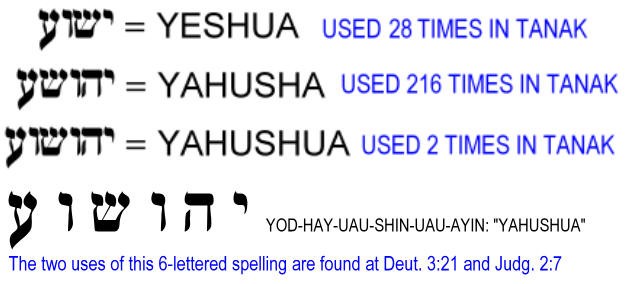
Concerning the specific number of uses of the spelling YOD-HAY-UAU-SHIN-UAU-AYIN
(using 2 letter
UAU’s), There are exactly two instances that refer to the successor of
Mosheh, Yahusha. The two uses of this 6-lettered
spelling are found at Deut.
3:21 and Judg. 2:7. In both of these books, this name was used with
only one “UAU”
in the following ratios:
Deuteronomy
/ Debarim:
7 to 1 (seven times, the spelling was YOD-HAY-UAU-SHIN-AYIN,
and 1 time
YOD-HAY-UAU-SHIN-UAU-AYIN).
Judges:
5 to 1 (five times, the spelling was YOD-HAY-UAU-SHIN-AYIN, and 1 time
YOD-HAY-UAU-SHIN-UAU-AYIN).
Overall
ratio:
216 to 2 (216 times,
the spelling in the TaNaK was YOD-HAY-UAU-SHIN-AYIN, and twice it
was YOD-HAY-UAU-SHIN-UAU-AYIN).
The characters written here are Aramaic:
יהושע
יהו
The
first part is not in question: YAHU
שע This
requires our close attention; is the pronunciation - SHUA? Or is
it simply SHA?
The root yaSHA means
"to deliver" - ישע
Let's check out
the correct Hebrew names of two prophets "Isaiah" and "Elisha":
ישעיהו YASHAYAHU Strong’s
#3470 – “Yah has saved.”
ישע YASHA Strong’s
#3468 – “Salvation, deliverance.”
שע Remove
the י and
we have – SHA
אלישע ALISHA Strong’s
#477 - “Al of deliverance.”
Therefore from
the Hebrew we have
יהושע
= YAHUSHA
The ending “SHA” and “SHUA” mean the same.
How is SHUA written
in Hebrew and does
it have a meaning?
שוע SHUWA Strong’s
#7768: “Cry for help.”
אלישוע ALISHUA Strong’s
no 474: “Al of riches.”
To get to the pronunciation YAHUSHUA we
would have to insert a ו between
the ע and
the ש and
spell His Name in Hebrew: יהושוע
- this spelling uses two of the letter ו
“Yahushua” is
seen twice out of 218 times in the TaNaK, so both “Yahushua” and “Yahusha”
are acceptable transliterations.
YahuSHUA and YahuSHA - SHUA and SHA both contain the Hebrew
root, yaSHA, meaning deliverance (salvation).
Both spellings, Yahushua and Yahusha, are endorsed by the inspired texts.
Concerning the specific number of uses of the spelling Yahushua
YOD-HAY-UAU-SHIN-UAU-AYIN (using 2 letter UAU’s), There are exactly two
instances in the TaNaK, referring to the successor of Mosheh (Joshua in the
KJV). The two uses
of this 6-lettered
spelling are in fact found at Deut. 3:21 and Judg. 2:7. Even
in these books, both variations in spelling are found. In these two
books alone, this name was used with only one “UAU”
in the following ratios:
Deuteronomy /
Debarim: 7 to 1: seven times, the spelling was
YOD-HAY-UAU-SHIN-AYIN (Yahusha), and 1 time
YOD-HAY-UAU-SHIN-UAU-AYIN (Yahushua).
Judges: 5
to 1; five times, the spelling was the 5-letterYOD-HAY-UAU-SHIN-AYIN
(Yahusha), and 1 time
YOD-HAY-UAU-SHIN-UAU-AYIN (Yahushua).
Overall ratio: 216
to 2 (216 times, the spelling in the TaNaK was YOD-HAY-UAU-SHIN-AYIN,
and twice it was YOD-HAY-UAU-SHIN-UAU-AYIN).
Since both are seen used in Scripture, then
either is acceptable. Both are equally correct, and
have the same meaning; however one of the two forms is the more widely used
in the inspired texts, and I am only pointing out to everyone that they
should take a look at the facts. I feel that the more accurate
would be the 5-lettered form used 216 times, but I have to accept that the
spelling seen only twice is fine also.
There is no reason to believe that the other 216 uses without the second UAU
are scribal errors. But, because the 216 uses of “YAHUSHA” are seen,
versus the 2 uses of “YAHUSHUA,” we should make note of it, and accept both
forms.
A
huge mistake to make is to think that the “vowel-pointing” of the 10th century
CE Masoretes is without flaw. Anyone can make a blunder. We also
know they had agendas, and one is with the Name Yahuah. Moreover, they
were about 2300
years removed in
time from
Mosheh, and many things they had to deal with were “best-guesses”. We
could not possibly know how William Shakespeare would pronounce certain
words 400 years ago.
One spelling to
examine closely is at ZecharYah 3. The Hebrew word #3091 used in these
texts is Yahusha (the KJV concordance
numbers are imbedded to help with your further study):
Zec 3:1 “And
he showed7200 me (853) Joshua3091 the
high1419 priest3548 standing5975 before6440 the
angel4397 of the LORD,3068 and
Satan7854 standing5975 at5921 his
right hand3225 to
resist7853 him.”
Translators have obviously modified the texts with words from a wide variety
of other languages between the Hebrew and English, such as the term “angel”
seen above (which is not English, but Greek). The rendering “Joshua”
is not very close to the better transliteration “Yahusha” either. But
they completely obliterated the Name “Yahuah” when they substituted the
letters LORD.
This is where personal research into the Truth of the Name begins. If
they will lie about the Name of the One we serve, then they will lie about
anything. For certain, we must be “over-comers” to be found doing what
our Mashiak expects of us until He comes.
And there is
much to overcome.
If
anyone can find any error in this study, please contact me with the proof - but
please accept that the Greek or Latin forms have no bearing on the
authenticity of Yahusha’s original, and
only true Hebrew Name.
“And there is no deliverance in anyone else, for there is no other Name
under the heaven given among men by which we need to be saved.” Acts 4:12
“Then shall those who fear Yahuah speak
to one another, and Yahuah listen
and hear, and a book of remembrance be written before Him, of those who fear Yahuahand
those who think upon His Name.” Mal
3:16
The "English" name, Jesus
The Norman invasion of 1066 introduced the letter "j" to England but the sound of the letter did not exist in the Old English language until the early 1200's. Over the next 300 years the hard "J" sound started to replace male names that began with I or Y because it sounded so masculine. Names like Iames became "James," Iakob became Jacob, and Yohan became "John." During the time the letter J was starting to gain acceptance, John Wycliffe became the first person to translate the New Testament from Latin into English in 1384. He preserved the Latin spelling and pronunciation of IESUS but his translation was unread by the common man because only a few hand-written copies of his Bible were produced which were quickly banned by the Church. The KJV was legally the only "authorized" version allowed in England, and was produced to stamp out the Geneva translation (The Geneva "Bible" contained many footnotes, reference helps, and conveyed a high level of general information for people to learn).

After William Tyndale was denied permission to print an English bible he went to visit Martin Luther and completed his translation of the New Testament in 1525. Tyndale had 18,000 copies printed at Worms and smuggled into England of which only two copies survive. After printing his revised edition of 1534 he was captured in Belgium, tried for heresy by order of the pope, and put to death in 1536 by strangulation after which his body was burned at the stake.
By the year 1611 the letter "J" was officially part of the English language and the King James Bible was printed along with pronunciation guides for all proper names like Jesus, Jew, Jeremiah, Jerusalem, Judah, and John.
The name "Jesus" has been in use ever since.
At Acts 4:12, we learn that there is only ONE NAME under heaven, given among men by which we may be saved, yet we see that the true Name has been under constant change over the centuries. The true Name of the Mashiak can be proven by deduction; and you should know that we cannot trust the Greek to explain the Hebrew. But, when we see that the Greek text uses the same letters (IESOUS) when referring to the men that translators spell as "Joshua" and "Jesus", then we know these letters refer to not just a similarname, but the same name; the Greek alphabet simply corrupted the Name for us.
We can fix that easily. The Mashiak of Yisharal certainly never had a Greek name, so let's hunt-down His real, Hebrew Name!
At Hebrews 4 and Acts 7 (Hebrews written by Paul, and Acts by Luke), we discover from the Greek that the Savior's Name is spelled IESOUS. I'm not saying these two men wrote the text in Greek, but the Greek is what we have received. The name "JESUS" isn't even in the original Scriptures - and you can check out the way it looked back in 1599 by clicking on this: 1599 Geneva Translation.
Hebrews 4 and Acts 7 refer to "Joshua" (Yahusha more accurately, alternately seen as Yahushua), using the same Greek letters, IESOUS. Now think very hard; could the successor of Mosheh and the Mashiak of Yisharal possibly have the same NAME in the original Hebrew? Scholars don't doubt it for a second that they did indeed. To learn the real name of your Savior, go look at the Hebrew letters for the spelling of "Joshua": yod-hay-uau-shin-ayin (It isn't rocket surgery you know). Both had the Hebrew name: YAHUSHA. The Greek alphabet cannot transliterate this word, and "Latinizing" the Greek form only makes it freakier. The Name of our Savior contains the Name of our Creator, because He is our Creator, and His Name is His identification (His identity is wrapped-up in His Name.
YAH = "I am" . . . Yahusha literally means "I am your Deliverer"
Therefore, all we have to do is go to the Hebrew texts, find the spelling of the name of the man that succeeded Mosheh, and we have found the Savior's Name perfectly preserved ~ and based on the texts of Shemoth (Exodus). Logical deduction brings this out. The Name "Yahusha" describes the FUNCTION or ROLE that our Creator has become.
To ignore this function/role, we have to overlook the phrase included by Gabrial when the Name was given:
The use of the Greek language/alphabet is a shadow-play to justify hiding the true Name of the Mashiak of Yisharal. What possible reason could a person have to hide behind the Greek language as a defense for the corruption of Yahusha’s Name? We have the Hebrew, so why put it through two or three languages to see what comes out the other side? “JESUS” is nothing like “YAHUSHA”, or even “YESHUA”. The Greek language cannot possibly transliterate the sound of the Name. The lack of appropriate letter sounds, and the Greek grammatical “rule” that adds the ending letter “S”, makes it impossible to do -- it’s beyond frustrating to watch someone defend it. It is most important to correct men who teach error, especially where a demonic name is bestowed upon our Savior and defended. In essence, people who want to cling to the "JESUS" error are saying “I can prove that YESHUA is correct by showing you the Greek.” The spelling “JOSHUA” is incorrect, and every concordance shows that this word is really either YAHUSHA or YAHUSHUA. What the Greek texts do show us at Hebrews 4 and Acts 7 is that the Mashiak had the same Name as the successor of Mosheh, since we see "IESOU" in Greek letters that refer to BOTH individuals. Scholars have agreed that this indicates clearly that the HEBREW original for this Name would have been either Yahusha or Yahushua. Yeshua does not mean “Yah (I am) is our (your) Deliverer.”
"Yeshua" Or "Yahusha"? "Joshua" isn't quite right; and "Yeshua" hides the Name of Yahuah, and Gabrial's explanation of the Name at Luke 1:21 describes thefunction (salvation) along with Who is providing that salvation.
You will soon learn that the form "JESUS" is derived directly from "YESHU", explained below. What "YESHU" means will change your thinking about this radically. In the Talmud, unbelieving Yahudim hatefully recorded the Name of the Mashiak of Yisharal as "YESHU", often seen spelled today as "Jeschu".
Q: Where did we get the form "JESUS" from?
A: The Jesuits (They defend the form using the Greek and Latin, hoping you'll never discover what you are about to read):
The form "YESHUA" has been adapted to form the acronym "YESHU", a mutilation of Yahusha's Name used by unbelieving Yahudim during the late 1st and 2nd century CE. The letters in "YESHU" stood for the sentence, "may his name be blotted out" (from the scroll of life). This "Yeshu" acronym is the real root of the form "JESUS", after going through Greek, then Latin:
YESHU (remember, this is an acronym, meaning "may his name be blotted out", referring to the scroll of life). A rabbinic word-play, from the original Hebrew words:
"Yemach Shmo u'Zikro" NOTE: There's not actually a letter "W" in the Hebrew alef-beth; the letter "W" is a rather new letter to our own alpha-beta. It's called a "DOUBLE-U" for a reason; our letter "U" is a perfect match with the sixth letter of the Hebrew alef-beth, now called a "WAW" - more accurately a "UAU".
Acronyms are abbreviated messages, like "SCUBA" stands for "self contained underwater breathing apparatus".
YESU IESOU - Going into Greek, the letter "Y" became an IOTA because Greek has no "Y"; also, the sound of "SH" was lost, because Greek has no letters to make this sound. The letter combination "OU" is a diphthong, arising from the Greek attempt to transliterate the sound "OO" as in "woof". Our letter "U" and the Hebrew letter "UAU" does this easily. JESU is used also.
YESOUS IESOU took on an ending "S" to form IESOUS, since the Greek wanted to render the word masculine with the ending "S". Going to Latin, the diphthong "OU" became "U".
JESUS In the early 1530's, the letter "J" developed, causing a tail on proper names beginning with the letter " i ", and words used at the beginning of sentences. This "J" is really the letter "IOTA". Many European languages pronounce "J" as the letter " i ", or a "Y" sound. They even spell Yugoslavia this way: "Jugoslavia".
Now you know. Tell everyone you know, and don't allow the Jesuits to succeed at this horrifying deception. Yeh-Zeus is not our Messiah; (The true name, Yahusha, means Yah-is our-deliverance)
To see the reactions of seminary-trained men on this topic, read them at: www.fossilizedcustoms.com/critic.html
*YahuwehShua: This is a form being seen recently among many Natsarim, and would be difficult if not impossible to find in the TaNaKh or any other Hebrew texts, although it is essentially exactly what "Yahusha"means and stands for, "Yahuah is our Deliverer". If it were to exist in Hebrew, it would be spelled like this:
YOD-HAY-UAU-HAY-SHIN-UAU-AYIN
There is no letter "W" in the Hebrew, since the letter "double-U" came into existence in western Europe during the 13th century, and even then only in certain areas; Sweden just added the letter "W" to their alphabet in 2007, even though the rest of the world has been spelling their country with the letter for centuries. The words they use this letter in are borrowed from other languages. The Hebrew letter commonly seen as "waw" is more accurately expressed as a "UAU", since it conveys the sound of "U", and sometimes "O". When the letter "hay" is followed by a "uau", the sound is to be "OO", as we hear in "hallelu Yah". That "u" sound you hear in "hallel
u Yah" is the letter "uau."Certainly, Yahuah
is our Deliverer, our only Savior, for He Himself took on the form of human flesh, offering that flesh as atonement for all the sins of mankind, once for all. Yahusha revealed the Father to us, and His chasid (lovingkindness) that endures forever.1Th 4:8 "Therefore he who rejects this does not reject man, but Alahim, Who also gives us His Set-apart Spirit."
Col 1:12-15: ". . . giving thanks to the Father who has made us fit to share in the inheritance of the set-apart ones in the light, Who has delivered us from the authority of darkness, and transferred us into the reign of the Son of His love, in whom we have redemption through His blood, the forgiveness of sins, Who is the likeness of the invisible Alahim, the first-born of all creation."
Jewish Encyclopedias are JEWISH ORTHODOX RABBIS, who revere the TALMUD, which prescribes the death-penalty for uttering the Name aloud. The "Masoretic vowel points" misdirect the true pronunciation, and that is why there is so much confusion.
Further study of the original letters: palaeo-Hebrew, Babylonian-Hebrew, and Greek transliteration:
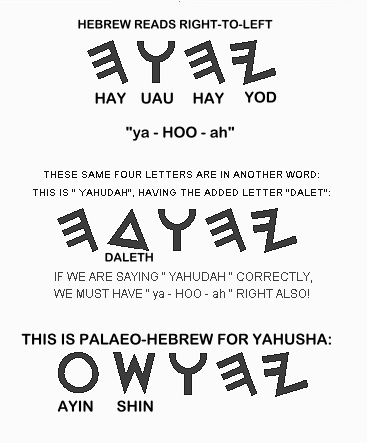
The question was posed, "Can we transliterate Messiah's Name (Yahusha) back into the Greek?"
The answer to this question is, not accurately; but let's investigate why that is. Going through the motions will help us appreciate the difficulty getting alphabets to interface with one another, and perhaps help emphasize the importance of putting our trust in the original autographs, not the transitional language of Greek. Mashiak Yahusha was not given a Greek name, but a well-recognized Hebrew Name, yod-hay-uau-shin-ayin, and spelled yod-shin-uau-ayin in it's shortened form. One has to understand the distinction between transliteration and translation.
I think it's a good idea for us all to take a little time looking at the results of the "reverse transliteration" process, to help us get closer to some names and words; however the "flaw" is thinking we can reach through foreign alphabets which have intermediate distortions of letters, and grammar rules which have no application to the original language. But, for the fun of it, it's not a bad idea at all.
IASOUAS
But, they wrote the Messiah's Name as IESOUS. Notice the letter "E" instead of "A". They were eliminating the "YAH" sound, and retaining the sound of their female healing deity, IESO. We see vowel distortions because the Masoretes spent 500 years steering the pronunciation away from the correct sound, so "Yahuah" would be unpronounced, and even today people believe the correct pronunciation has been lost forever.
Let's take the word "DUDE" and transliterate it into Hebrew. Oddly enough, taking this word to the Hebrew alphabet simply involves 3 letters: dalet-uau-dalet -- which spells the name of the famous king of Yisharal known as "DAVID". In Hebrew, we have been led to believe this word is the name "DAVID", or even "DAWID". Actually, either of these transliterations could be slightly off, or different from the original word meaning "beloved" in Hebrew. It may be that the sound of the Hebrew letters, dalet-uau-dalet, is in fact, "DUDE", or "DA'UD". It is very closely associated, it seems, with the Hebrew word for "breast", "DAD" (with a short sounding letter "A"). There are plenty of Arabian folks running around, probably Ishmaelites (Hagar's descendants), and even some Edomites (Esau's descendants, Edomim), who are called by Hebrew names; one you may see often is "YUSEF", or YOSEF. Another name that is popular with these Arabs is DA'UD. So, perhaps my theory that the Hebrew letter we call "waw" (uau) is far from being anything like our modern letter "W", and is more like our familiar letter "U". "W" is called "double-U"; so maybe we need to think of the "waw" as a single "U", since it seems to sound like one in so many Hebrew words.
The letter "W" is recent, only coming into existence in the 1300's; so the actual letter in the Hebrew is closer to being what we know as the letter "U". The phrase "HALLELU YAH" uses this same Hebrew letter called "waw" to give the "U" sound. The name of the tribe "YAHUDAH" gives us the same result (yod-hay-uau-dalet-hay) -- and this is the same spelling, and order, for the Creator's personal Name, with the addition of the letter dalet. Perhaps instead of calling it a "waw", we need to call it a "UAU".
The first two letters in the Greek form are IA. The next step is to make the only choice left to us for the "SH" sound: SIGMA. Finally, I would choose the final letters as UPSILON and ALPHA.
So, we each should study enough to answer the question, "Can we transliterate Messiah's Name (Yahusha) back into the Greek?" The more I've looked into it, the answer is no; it's just a matter of how much mutilation a person is willing to accept -- toward the Name above all names.
Scholars, etymology experts, and theologians will not disagree with you about other Hebrew names’ true transliterations. “James” is really “Ya’aqob,” “John” is really “Yahukanon”, and “Isaiah” is really “Yasha Yahu.” But, when you want to use the correct Name for the Mashiak of Yisharal, they may get red-faced and defensive of their “Jesus” derived from YESHU.
Could there be a spiritual stronghold involved in the use of the word “Jesus”? If you know it to be a lie, then stop calling your Mashiak this false name. Call Him by His real Name, the Name above all names: YAHUSHA. It’s the same spelling in Hebrew (YOD-HAY-UAU-SHIN-AYIN) used for the successor of Mosheh whom they call “Joshua”, as anyone can see even the Greek letters match for both at Acts 7 and Hebrews 4.
Letter shapes
changed over time, and so have their sounds.
The controversial
Hebrew letter often referred to as “WAW” sounds as our modern letter
“U”, and the ancient form of this letter’s appearance was retained
by the Greek: Y. It
is NOT our modern English letter “Y”, but rather our “U”. It
became the Greek “UPSILON”, or “U”. Going
into Latin, this “Y” shaped Greek letter lost the vertical stem, and
was written “V”. Again,
this is NOT our modern English letter “VEE”, but still the sound of
our letter “U”.
This is the
progression over time for the letter:
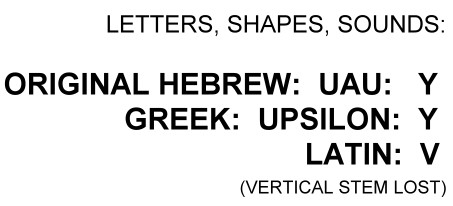
See link below for more details on the Name:
WHAT IS THE NAME OF THE CREATOR OF THE UNIVERSE, AND HOW IS IT BEST PRONOUNCED?
Wikipedia: Blotted-out "Yahusha"
TRUE NAME DELETED FROM SITE
The Latin
word for “sword” is: GLADIUS.
GLADIVS is
the original way the word appeared in Latin letters,
but remember
to retain the original sound of the Latin “V” as our modern
letter “U”. Please
do not impose your modern “VEE” upon this letter. Because
this was done, words like “JEHOVAH” have been improperly
understood today. The
sound of these letters in the mind of people living over 400
years ago was more accurately “YAHOUAH”
because the
“OV” our really our “OU”. The
“J” was sounded as our modern letter “Y”, not “JAY” as we
commonly perceive it today.
They were not
pronouncing it “DJA-HO-VAH”, but “YAHUAH”.
UU = VV,
W: The
letter “W” (double-U) is another story, since it is a very new
letter also derived from the Hebrew UAU, never having existed
prior to the 13th century.
Lew White
